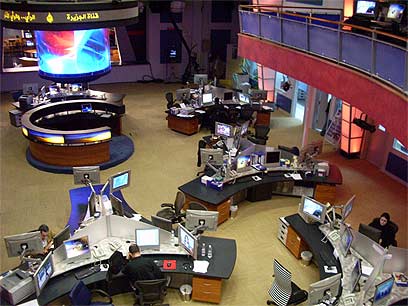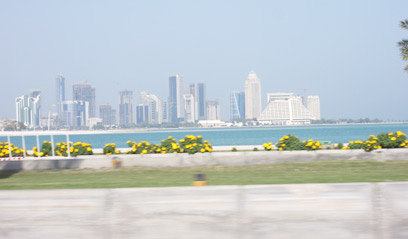
The jewel in the crown
Though controversial in Arab world, al-Jazeera sees itself as a symbol, with all that this implies. Ynet reporter visited Qatari station during Vice Premier Peres’s recent visit, and heard about its success and its plans for the future
This might seem somewhat strange for a station that only last October celebrated its first decade, but it’s a very clear sign that al-Jazeera sees itself as a symbol and an institution in the Arab world.
And in fact, there is no reason to see things otherwise. In the past decade the network was involved in a series of diplomatic crises in both the Arab world and the outside world. The current crisis, involving Qatar and Tunisia, occurred after al-Jazeera interviewed a Tunisian opposition leader and Tunisia closed its Doha embassy in protest. Al-Jazeera has also managed to arouse the ire of Egypt, Syria, Jordan, Iraq, and others.
The station has succeeded in having real influence. So, for example, more than once American forces in Iraq have captured armed men from Arab or other Muslim countries who volunteered for the war against the “American invaders.” When interrogated, they said, “We saw on al-Jazeera that there was a war, so we came to help out.”
I broadcast, therefore I am
The Qatari station has more than once dictated plot lines (for example, al-Jazeera was the first to call the recent clash in Lebanon “the sixth war” while in Israel they were still insisting it was a “response”). It has created diplomatic crises with the US (former Defense Minister Donald Rumsfeld attacked al-Jazeera on more than one occasion for its reporting on Iraq, calling its broadcasts “propaganda”), and in general it looks like the station was seeking first and foremost to broadcast to the world that it exists, big time.
Al Jazeera's station in Qatar (Photo: Roee Nahmias)
“No one pressures us about what to broadcast and how. We implement our policy as we see fit. We’re an independent station and if there’s an incident worth covering, we cover it,” says a source at al-Jazeera. “Tunisia closed its embassy in order to force Qatar to put pressure on us, but this has no effect. In any case, Qatar did not close its embassy in Tunisia and diplomatic relations continue as appropriate.”
This isn’t the only incident. “From the get-go Tunisia would not give its approval for a journalist of ours to work there, the current Iraqi authorities closed our offices there, and we work only in northern Iraq in the Kurdish area, and in Algeria and Saudi Arabia we don’t have journalist either,” he explains. The main reason, of course, is their longstanding axe to grind with al-Jazeera’s editorial policy and coverage of events in their countries.
I spoke to the al-Jazeera representative this week during Shimon Peres’s visit to Qatar. A number of journalists accompanied Peres, and in addition to seeing Qatar’s sights, we were given a tour of the station.
It is hard to overstate the importance for Qatar of the decision to establish al-Jazeera. Since Emir Sheikh Hamad bin Khaleifa al-Thani took power in a bloodless coup in 1995 by deposing his father, he has led his small, wealthy country forward in giant steps. In 1996 he decided to establish al-Jazeera to broadcast news in a different style, a major departure from the government-controlled stations in the Arab world. And in fact, the Qatari station quickly made such great waves that everyone knew its name and recognized its logo.
With time came an appetite. More and more channels were added over the years. The station employs some 2,400 people, mostly foreigners, spread throughout the world, in order to provide a fast, up-to-date picture of the news.
In the Pipeline: A Newspaper and Web Site
In order to understand the extent of al-Jazeera’s exposure remember the following statistics: Sources at the station talk about some 50 million households that watch its content in Arabic and some 80 million that watch it in English. But they’re not resting on their laurels. About two months have passed since their English-language station began operating, and a number of weeks since the launch of the documentary channel, and they’re already working on the next project, a pan-Arab newspaper to compete with al-Sharq al-Awsat and al-Hayat, large papers published in London.
Skyscrapers in Doha (Photo: Roee Nahmias)
For this purpose the paper has already recruited al-Hayat’s deputy editor, Abdul Wahab Badrakhan, who has been working on getting the paper started. In addition, there is talk of starting an economic station and strengthening existing interactive content. “We are also planning to upgrade our web site,” say sources at the station, hinting that in the near future we’ll be seeing more and more video content on their site. “Thirty-five journalists and desk staffers are working on the web site, and it sometimes obtains exclusive stories. We hope soon to upgrade the video content, but it takes time.”
It sometimes seems like al-Jazeera really does reach everywhere in the world. During the summer’s war in Lebanon Hizbullah head Hassan Nasrallah granted the station a special interview from his hiding place, and Osama bin Laden has given Al Jazeera videotapes to broadcast. All of this was apparently done with the understanding that the station is the pan-Arab arena of today. It is so widely viewed that in poor countries such as Mauritania, Sudan, and Somalia, al-Jazeera’s TV programs are broadcast on radio.
“Not a single days goes by when we don’t have a delegation coming here, and in general, almost everyone who comes to Doha visits the station,” notes the source. Sometimes famous leaders also visit. Recently, for example, Venezuelan President Hugo Chavez was there. UN Secretary General Ban Ki-moon was also there while serving in his previous role as South Korean Foreign Minister. Vice Premier Shimon Peres visited the station this week, was interviewed by the Arabic-language and English-language stations, and answered questions on current issues. Sometimes it seems like Qatar owes more to Al Jazeera than the other way around.










